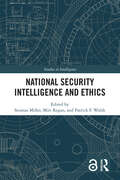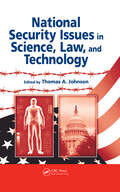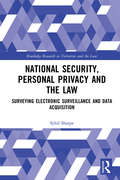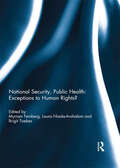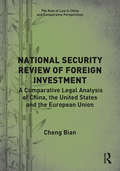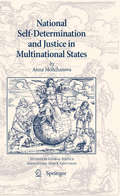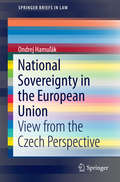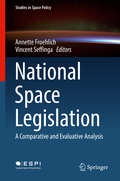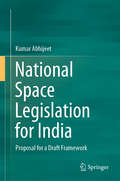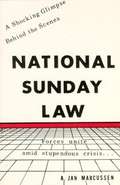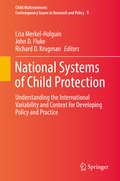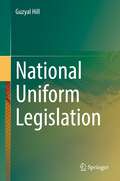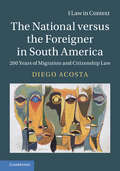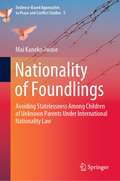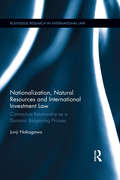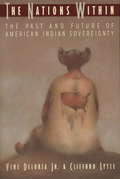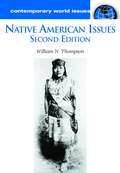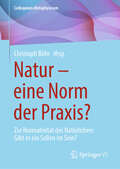- Table View
- List View
National Security Intelligence and Ethics (Studies in Intelligence)
by Seumas Miller Mitt Regan Patrick F. WalshThis volume examines the ethical issues that arise as a result of national security intelligence collection and analysis. Powerful new technologies enable the collection, communication, and analysis of national security data on an unprecedented scale. Data collection now plays a central role in intelligence practice, yet this development raises a host of ethical and national security problems, such as: privacy; autonomy; threats to national security and democracy by foreign states; and accountability for liberal democracies. This volume provides a comprehensive set of in-depth ethical analyses of these problems by combining contributions from both ethics scholars and intelligence practitioners. It provides the reader with a practical understanding of relevant operations, the issues that they raise, and analysis of how responses to these issues can be informed by a commitment to liberal democratic values. This combination of perspectives is crucial in providing an informed appreciation of ethical challenges that is also grounded in the realities of the practice of intelligence. This book will be of great interest to all students of intelligence studies, ethics, security studies, foreign policy, and International Relations.
National Security Issues in Science, Law, and Technology
by Thomas A. JohnsonUsing the best scientific decision-making practices, this book introduces the concept of risk management and its application in the structure of national security decisions. It examines the acquisition and utilization of all-source intelligence and addresses reaction and prevention strategies applicable to chemical, biological, and nuclear weapons; agricultural terrorism; cyberterrorism; and other potential threats to our critical infrastructure. It discusses legal issues and illustrates the dispassionate analysis of our intelligence, law enforcement, and military operations and actions. The book also considers the redirection of our national research and laboratory system to investigate weapons we have yet to confront.
National Security Law (Fifth Edition)
by Stephen Dycus Arthur L. Berney William C. Banks Peter Raven-HansenNational Security Law, Fifth Edition, provides the broadest exploration of both constitutional and domestic law issues in National Security of any book in the field.
National Security, Personal Privacy and the Law: Surveying Electronic Surveillance and Data Acquisition (Routledge Research in Terrorism and the Law)
by Sybil SharpeThere have been significant changes in public attitudes towards surveillance in the last few years as a consequence of the Snowden disclosures and the Cambridge Analytica scandal. This book re-evaluates competing arguments between national security and personal privacy. The increased assimilation between the investigatory powers of the intelligence services and the police and revelations of unauthorised surveillance have resulted in increased demands for transparency in information gathering and for greater control of personal data. Recent legal reforms have attempted to limit the risks to freedom of association and expression associated with electronic surveillance. This book looks at the background to recent reforms and explains how courts and the legislature are attempting to effect a balance between security and personal liberty within a social contract. It asks what drives public concern when other aspects seem to be less contentious. In view of our apparent willingness to post on social media and engage in online commerce, it considers if we are truly consenting to a loss of privacy and how this reconciles with concerns about state surveillance.
National Security, Public Health: Exceptions to Human Rights?
by Myriam Feinberg, Laura Niada-Avshalom and Brigit ToebesThe book deals with the complicated relationships between national security and human rights, and between public health and human rights. Its premise is the fact that national security and public health are both included in human rights instruments as ‘exceptions’ to the human rights therein sanctioned, yet they can arguably be considered as human rights themselves and be equally valuable. The book therefore asks to what extent the protection of the individual could – or should – be overridden to enable the protection of the national security or public health of the general public. Both practice and case law have shown that human rights risk being set aside when they clash with the protection of national security or public health. Through theoretical analysis and practical examples, the book addresses the conflicts that arise when the concepts of national security and public health are used – and abused – and other rights, including freedom of speech, procedural freedoms, individual health, are violated as a consequence. It provides many interesting findings on the values that states are ready to protect – and forego – to ensure their safety, which can contribute to the ongoing debate on the protection of human rights. This book was originally published as a special issue of The International Journal of Human Rights.
National Security Review of Foreign Investment: A Comparative Legal Analysis of China, the United States and the European Union (The Rule of Law in China and Comparative Perspectives)
by Cheng BianIn recent years, China, the US, and the EU and its Member States have either promulgated new national laws and regulations or drastically revised existing ones to exert more rigorous government control over inward foreign direct investment (FDI). Such government control pertains to the establishment of an ex-ante review regime of FDI in the host state in sectors that are considered as ‘sensitive’ or ‘strategic’, with an aim to mitigate the security-related implications. This book conducts a systematic and up-to-date comparative study of the national security review regimes of China, the US, and the EU, using Germany as an exampling Member State. It answers a central research question of how domestic law should be formulated to adequately protect national security of the host state whilst posing minimum negative impacts to the free flow of cross-border investment. In addition to analyzing the latest development of the national security review regimes in aforementioned jurisdictions and identifying their commonalities and disparities, this book establishes a normative framework regarding the design of a national security review regime in general and proposes specific legislative recommendations to further clarify the law. This book will be of interest to scholars in the field of international and comparative investment law, investors who seek better compliance programs in the host state, and policymakers who aim for high-quality regulation on foreign investment.
National Self-Determination and Justice in Multinational States
by Anna MoltchanovaSubstate nationalism, especially in the past fifteen years, has noticeably affected the political and territorial stability of many countries, both democratic and democratizing. Norms exist to limit the behavior of collective agents in relation to individuals; the set of universally accepted human rights provides a basic framework. There is a lacuna in international law, however, in the regulation of the behavior of groups toward other groups, with the exception of relations among states. The book offers a normative approach to moderate minority nationalism that treats minorities and majorities in multinational states justly and argues for the differentiation of group rights based on how group agents are constituted. It argues that group agency requires a shared set of beliefs concerning membership and the social ontology it offers ensures that group rights can be aligned with individual rights. It formulates a set of principles that, if adopted, would aid conflict resolution in multinational states. The book pays special attention to national self-determination in transitional societies. The book is intended for everyone in political philosophy and political science interested in global justice and international law and legal practitioners interested in normative issues and group rights
National Sovereignty in the European Union: View from the Czech Perspective (SpringerBriefs in Law)
by Ondrej HamuľákThis volume assesses the implications of membership in the European Union for countries’ understanding of the concept of sovereignty, based on the perspective of the Czech Republic. The starting point of this work is acceptance of the Czech Republic’s membership in the European Union as a basic fact. The goal of the analysis presented here is to offer a theoretical approach to reconciling state sovereignty with the participation of the Czech Republic in the European integration project. To do so, the book pursues an in-depth analysis of the reactions of the Constitutional Court of the Czech Republic to the challenges associated with membership in the EU. Above all, it addresses the following two basic research questions:1. Is membership of the state in the European Union associated with a loss of sovereignty, a sharing of sovereignty, or does it have no real consequences for the scope or understanding of the concept of state sovereignty, such that the phenomenon remains a classical, static and defining element of the state?2. How does the Czech Constitutional Court deal with the specific characteristics of European Union law and what is its stance on the nature of the relationship between supranational and national law?
National Space Legislation: A Comparative and Evaluative Analysis (Studies in Space Policy #15)
by Vincent Seffinga Annette FroehlichThis book provides a unique in-depth comparative and evaluative analysis based upon primary sources. Therefore, it does not only provide a more complete understanding of the subject compared to other publications but, because it provides a full perspective, can also serve as a basis for further research. The interest in national space legislation, and the importance thereof to regulating space activities conducted by private entities, gives a clear incentive to conduct a comparative analysis of the national space legislation of various states. The purpose of this report is to provide such a comparative analysis that will detail the similarities and differences between the national space laws of selected states with a focus on European comprehensive national space legislation. The states discussed are: Sweden, the United Kingdom, Australia, China, Belgium, the Netherlands, France, Austria, Indonesia, Denmark, New Zealand and Luxembourg. This report is intended to assist the efforts of states that are seeking to enact or revise national space legislation not only by presenting the approaches taken by other states, but also by presenting, as far as possible, the rationale behind their approaches. The readership of this book consists of academics and professionals in space law and can further assist policymakers wishing to revise or enact national space legislation.
National Space Legislation for India: Proposal for a Draft Framework
by Kumar AbhijeetThis book discusses the need for national space legislation in India in the wake of private stakeholders entering the field and the expansion of outer space activities. Highlighting India’s commitment to responsibly pursuing its outer space ambitions through rule of law, the book discusses the rationale behind national space legislation and addresses the requirements of both international and domestic law. In order to suggest draft framework national space legislation for India, it examines and compares the legislations of twenty major space-faring countries to identify the best practices. One of the few scientific studies in India that proposes draft framework legislation for space activities in India, this book summarizes the three main reasons why national space legislation is necessary – to fulfill international obligations, to address India’s specific requirements and to enable non-governmental entities to participate. A must read for anyone interested in international space law and India’s role and responsibility toward it, it is a valuable resource for academics, scientists, policymakers, industry executives, lawyers and students as well as amateur space enthusiasts.
National Sunday Law
by A. Jan MarcussenNational Sunday Law explains exactly who the beast is, what the image of the beast is, and what the mark of the beast is. <P><P>A fascinating book and a must for anyone in search of the truth. National Sunday Law is a small paperback book with less than 100 pages and medium size print, a very quick read. <P><P>National Sunday Law was first published in 1983 and is now in its 110th printing with 36.8 million in print.
National Systems of Child Protection: Understanding the International Variability and Context for Developing Policy and Practice (Child Maltreatment #8)
by Richard D. Krugman Lisa Merkel-Holguin John D. FlukeThis volume provides a wide spectrum description analysis of the contemporary and well established child protection systems in a range of countries, such as Australia, Canada, Netherlands and Spain. It presents a brief orientation about the public and private systems involved in protecting children in each country. Further the book identifies current key policy and implementation drivers that orient the systems of child protection, such as children’s rights, family preservation, use of evidence and public health orientation. Finally it presents a critical analysis of the strengths and limitations of the systems, as well as, strategies for prospects for improving outcomes for children and their families.
National Uniform Legislation
by Guzyal HillThis book aims to develop a conceptual framework upon which to draw for analysis of new and existing national reforms in Australia. Due to growth in the volume and complexity of national uniform legislation, law reform agencies, the Commonwealth, state and territory governments and policy institutions have more, rather than less, to do. This book explores how they are required to respond to debates among actors from divergent geographical, commercial and ideological backgrounds, who sometimes demonstrate irreconcilable differences in values and perspectives.From a policy implication perspective, this book summarises a vast quantity of original and complex data so that it can be applied in the field—among policymakers, reformers, legislative drafters, students and the wider audience of legal practitioners working with harmonised legislation in federations. This book acknowledges that uniform legislation is not a panacea for all legal challenges currently faced by federations. However, this book takes a step towards demystifying the many confusing factors that have obscured the underlying general principles. A working theory of ‘federal harmonisation’ enables ‘the art of the impossible’ to become a practical reality. This book condenses data on legislation in models. The models enable transparent, evidence-based decisions in the process of a federation’s harmonisation to progress regulatory best practices and achieve more reliable, sustainable results.
The National versus the Foreigner in South America: 200 Years of Migration and Citizenship Law (Law in Context )
by Diego AcostaSince the turn of the century, South American governments and regional organisations have adopted the world's most open discourse on migration and citizenship. At a time when restrictive choices were becoming increasingly predominant around the world, South American policymakers presented their discourse as being both an innovative and exceptional 'new paradigm' and part of a morally superior, avant-garde path in policymaking. <P><P>This book provides a critical examination of the South American legal framework through a historical and comparative analysis. Diego Acosta uses this analysis to assess whether the laws are truly innovative and exceptional, as well as evaluating their feasibility, strengths and weaknesses. By analysing the legal construction of the national and the foreigner in ten South American countries during the last two centuries, he demonstrates how different citizenship and migration laws have functioned, as well as showing why states have opted for certain regulation choices, and the consequence of these choices for state- and nation-building in the continent. An invaluable insight for anyone interested in global migration and citizenship discussions.<P> Offers in depth coverage and critical analysis of the present legal regulations of migration and citizenship law.<P> Discusses the extremely interesting principles behind South American migration and citizenship laws, including universal citizenship, the non-criminalisation of irregular migration, and the right to migrate as fundamental.<P> Features analysis of ten South American countries across two centuries which uncovers wider transnational trends and legal mechanisms.<P>
Nationalism and the Rule of Law
by Iavor RangelovThe relationship between nationalism and the rule of law has been largely neglected by scholars despite the fact that separately, they have often captured public discourse and have emerged as critical concepts for the social sciences. This book provides the first systematic account of this relationship. The main focus of the book is to develop an analytical framework for understanding the interactions of nationalism and the rule of law by focusing on the domains of citizenship, transitional justice, and international justice. The book engages these insights further in a detailed empirical analysis of three case studies from the former Yugoslavia. The author argues that while the tensions and contradictions between nationalism and the rule of law have become more apparent in the post-Cold War era, they can also be harnessed for productive purposes. In exploring the role of law in managing and transforming nationalism, the book emphasizes the deliberative character of legal processes and offers an original perspective on the power of international law to reshape public discourse, politics, and legal orders.
Nationality and Statelessness under International Law
by Alice Edwards Laura Van WaasWritten by leading experts, Nationality and Statelessness under International Law introduces the study and practice of 'international statelessness law' and explains the complex relationship between the international law on nationality and the phenomenon of statelessness. It also identifies the rights of stateless people, outlines the major legal obstacles preventing the eradication of statelessness and charts a course for this new and rapidly changing field of study. All royalties from the sale of this book support stateless projects.
Nationality of Foundlings: Avoiding Statelessness Among Children of Unknown Parents Under International Nationality Law (Evidence-Based Approaches to Peace and Conflict Studies #5)
by Mai Kaneko-IwaseThis is the first book dedicated to clarifying the concept of “foundlings” and how to best prevent their statelessness in light of the object and purpose of Article 2 of the 1961 UN Convention on the Reduction of Statelessness and equivalent nationality law provisions. Among other features, the book defines the terms “foundling,” including the maximum age limit of the child to be considered a “foundling”; “unknown parents”; being “found” in a territory; and “proof to the contrary”; as well as the procedural issues such as the appropriate burden and standard of proof. In doing so, the book draws upon a comparative analysis of national legislation on “foundlings” covering 193 states, case law, and precedents in some states as well as international human rights law norms including the best interests of the child. As its conclusion, the book proposes an inclusive model “foundling provision” and a commentary to inform legislative efforts and interpretation of the existing provisions. Its findings are useful not only to state parties to the 1961 Convention but also to non-state parties, particularly in countries lacking systematic civil documentation or experiencing the effects of armed conflicts, migration, trafficking, and displacement.
Nationalization, Natural Resources and International Investment Law: Contractual Relationship as a Dynamic Bargaining Process (Routledge Research in International Law)
by Junji NakagawaNationalization disputes in natural resources development are among the most disputed issues of international investment law. This book offers a fresh insight into the nature of nationalization disputes in natural resources development and the rules of international investment law governing them by systematically analyzing (1) the content of investment contracts in natural resources development, and (2) the results of nationalization disputes in natural resources development from the perspective of dynamic bargaining theory. Based on the comprehensive and systematic empirical analyses, the book sheds new light on contractual renegotiation and renewal as a hardly known but practically normal solution of nationalization disputes and presents a set of soft law rules governing contractual renegotiation and renewal.
Nations Divided
by Marjorie N. FeldThe anti-apartheid struggle remains one of the most fraught episodes in the history of modern Jewish identity. Just as many American Jews proudly fought for principles of justice and liberation in the Civil Rights Movement, so too did they give invaluable support to the movement for racial equality in South Africa. Today, however, the memory of apartheid bedevils the debate over Israel and Palestine, viewed by some as a cautionary tale for the Jewish state even as others decry the comparison as anti-Semitic. This pioneering history chronicles American Jewish involvement in the battle against racial injustice in South Africa, and more broadly the long historical encounter between American Jews and apartheid. In the years following World War II and the Holocaust, Jewish leaders across the world stressed the need for unity and shared purpose, and while many American Jews saw the fight against apartheid as a natural extension of their Civil Rights activism, others worried that such critiques would threaten Jewish solidarity and diminish Zionist loyalties. Even as the immorality of apartheid grew to be universally accepted, American Jews continued to struggle over persistent analogies between South African apartheid and Israel's Occupation. As author Marjorie N. Feld shows, the confrontation with apartheid tested American Jews' commitments to principles of global justice and reflected conflicting definitions of Jewishness itself.
The Nations Within
by Vine DeloriaThe message of The Nations Within is an urgent on, and should be read by anyone concerned with American Indian affairs today. "Those of us who try to understand what is happening in North American Indian communities have learned to see Vine Delora, Jr., both as an influential actor in the ongoing drama and also as its most knowledgeable interpreter. This new book on Indian self-rule is the most informative that I have seen in my own half-century of reading. Deloria and his co-author focus on John Collier's struggle with both the U.S. Congress and the Indian tribes to develop a New Deal for Indians fifty years ago. It is a blow-by-blow historical account, perhaps unique in the literature, which may be the only way to show the full complexity of American Indian relations with federal and state governments. This makes it possible in two brilliant concluding chapters to clarify Indian points of view and to build onto initiatives that Indians have already taken to suggest which of these might be most useful for them to pursue. The unheeded message has been clear throughout history, but now we see how--if we let Indians do it their way--they might more quickly than we have imagined rebuild their communities."--Sol Tax, Professor Emeritus of Anthropology, University of Chicago
Native American Issues: A Reference Handbook (2nd edition)
by William N. ThompsonThe major theme is sovereignty, a concept that is defined in the introductory section, with discussion of culture and assimilation; restoration of land claims, and water and other rights; economic development and gambling; political jurisdiction; and Canadian Native Americans. Subsequent sections provide a chronology, biographical sketches of Native leaders, discussion of court cases and legislation, and listings of organizations, and print and non-print resources.
Native Americans and the Christian Right: The Gendered Politics of Unlikely Alliances
by Andrea SmithIn Native Americans and the Christian Right, Andrea Smith advances social movement theory beyond simplistic understandings of social-justice activism as either right-wing or left-wing and urges a more open-minded approach to the role of religion in social movements. In examining the interplay of biblical scripture, gender, and nationalism in Christian Right and Native American activism, Smith rethinks the nature of political strategy and alliance-building for progressive purposes, highlighting the potential of unlikely alliances, termed "cowboys and Indians coalitions" by one of her Native activist interviewees. She also complicates ideas about identity, resistance, accommodation, and acquiescence in relation to social-justice activism. Smith draws on archival research, interviews, and her own participation in Native struggles and Christian Right conferences and events. She considers American Indian activism within the Promise Keepers and new Charismatic movements. She also explores specific opportunities for building unlikely alliances. For instance, while evangelicals' understanding of the relationship between the Bible and the state may lead to reactionary positions on issues including homosexuality, civil rights, and abortion, it also supports a relatively progressive position on prison reform. In terms of evangelical and Native American feminisms, she reveals antiviolence organizing to be a galvanizing force within both communities, discusses theories of coalition politics among both evangelical and indigenous women, and considers Native women's visions of sovereignty and nationhood. Smith concludes with a reflection on the implications of her research for the field of Native American studies.
Natur – eine Norm der Praxis?: Zur Normativität des Natürlichen: Gibt es ein Sollen im Sein? (Colloquium Metaphysicum)
by Christoph BöhrIst Natur eine Norm der Praxis? Mit anderen Worten gefragt: Weist seine Natur dem Menschen einen Weg zum rechten – gar zu einem gebotenen – Handeln? Seit Aristoteles wurde diese für die menschliche Lebensform gewichtige Frage mit einem unmissverständlichen ‚Ja‘ beantwortet. Die Neuzeit neigt überwiegend zu einer gegenteiligen Antwort. Denn, so wird jetzt gefragt: Was ist eigentlich Natur? Ist sie dem Menschen gleichsam als Mitgift in die Wiege gelegt, also seinem Lebensvollzug und seinen Handlungsentscheidungen mit verbindlichem Anspruch vorgegeben? Oder ist Natur – das Sein des Menschen – allein das, was der Mensch zwischen Geburt und Tod aus sich selbst macht, also bloß ein So-und-Jetzt-Sein? Ist der Mensch im Sinne normativer Natürlichkeit möglicherweise ganz und gar unbestimmt? Kurzum: Wie steht es um die Natur des Menschen und deren Anspruch auf Normativität? Dieser Streitfrage, die heute im Für und Wider – nicht zuletzt im Blick auf die sich zunehmend verschärfende Herausforderung einer Selbstbehauptung des Humanen angesichts einer immer mächtiger werdenden Bevormundung unserer Lebensvollzüge durch Algorithmen – auf das Heftigste in Philosophie wie in Politik verhandelt wird, gehen die Beiträge dieses Buches, das viele inzwischen maßgeblich gewordene Wortmeldungen zur Sache versammelt, nach.
Natur als Rechtssubjekt: Die neuseeländische Rechtsetzung als Vorbild für Deutschland
by Katharina Bader-PlabstDas Buch analysiert die Möglichkeit der Normierung eigener Rechte der Natur in der deutschen Rechtsordnung. Als Inspiration hierzu wird der Vergleich zur Eigenrechtsgesetzgebung in Neuseeland gezogen. Neuseeland normierte als eines der ersten Länder der Welt eigene Rechte der Natur, indem das Land den Te Urewera Wald und den Whanganui Fluss als Rechtssubjekte gesetzlich anerkannte. Die Gesetzgebung wurde weltweit als umweltrechtliche Pionierleistung gefeiert. In Zeiten der Klima- und Biodiversitätskrise liegt daher der Gedanke nahe, auch im deutschen Rechtssystem über die rechtliche Aufwertung der Natur nachzudenken. Die Arbeit befasst sich daher mit der Frage, ob Rechte der Natur nach neuseeländischem Vorbild in Deutschland sowohl rechtlich zulässig als auch geboten und erforderlich sind.
